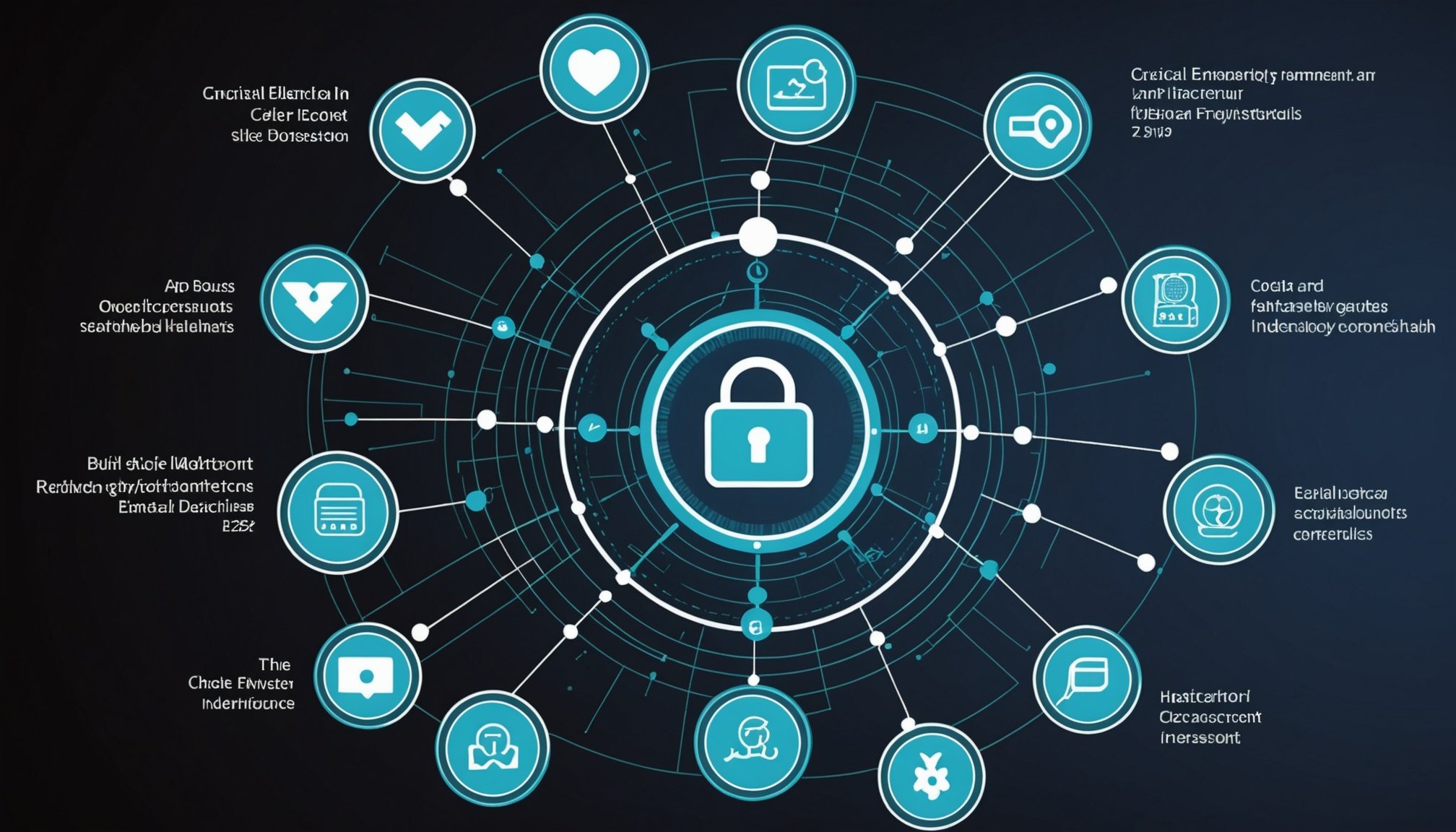Overview of Cybersecurity in the UK Healthcare Sector
In the realm of cybersecurity, the UK healthcare sector faces unique challenges requiring robust and tailored measures. With the growing reliance on digital platforms, protecting patient data has become a paramount concern. Health records are a prime target for cybercriminals due to their sensitive and personal nature, therefore highlighting the importance of cybersecurity to safeguard patient information.
UK healthcare providers often struggle with outdated IT systems, which makes maintaining cybersecurity a significant hurdle. These legacy technologies can inadvertently create vulnerabilities and an attractive landscape for cyber threats. Consequently, understanding and addressing these threat landscapes is vital for ensuring the protection of sensitive data.
Topic to read : Transforming Retail Supply Chains in the UK: Harnessing Big Data for Unprecedented Transparency and Efficiency
Recent statistics reveal an alarming rise in cyber threats targeting the healthcare sector. This surge underscores the pressing need to adopt comprehensive cybersecurity strategies. Current trends indicate an increase in sophisticated cyber-attacks, including ransomware and phishing, attacking the heart of healthcare operations.
In this landscape, the adoption of proactive, system-wide security measures, alongside an understanding of these challenges, will better equip UK healthcare institutions to protect against evolving cyber threats. Strategic investments in technology and ensuring staff are informed about potential cyber risks is essential for creating a resilient healthcare environment.
Have you seen this : Revolutionizing UK Marketing: Proven AR Techniques to Create Unforgettable Campaigns
Key Vulnerabilities in Healthcare Cybersecurity
Understanding the vulnerabilities within healthcare IT systems is essential for mitigating risks. One major weakness lies in the widespread use of outdated technologies and software, which have inherent security flaws. These systems struggle to defend against modern threats, making healthcare institutions an easy target for cyber-attacks.
Human error also plays a significant role in cybersecurity breaches. Mistakes such as improper handling of data or clicking on malicious links can inadvertently open doors for cybercriminals. This highlights the critical need for comprehensive employee training in cybersecurity protocols to reduce such risks.
Additionally, risk assessment must be an ongoing process within healthcare facilities. Regularly evaluating and updating security measures can help identify and correct potential vulnerabilities before they are exploited.
Given the sensitive nature of patient data, healthcare providers must prioritise closing these security gaps. Investing in secure infrastructure and fostering a culture of cybersecurity awareness is not merely advisable—it is imperative for safeguarding valuable information. Failure to do so could lead to data breaches, resulting in severe financial and reputational consequences. Thus, addressing key vulnerabilities is fundamental to protecting the integrity of the UK healthcare sector.
Relevant Regulations and Compliance Requirements
Navigating the complex regulatory landscape is crucial for UK healthcare providers aiming to enhance cybersecurity. The General Data Protection Regulation (GDPR) brings significant implications, ensuring patient data security is a top priority. This regulation mandates stringent practices in data collection, storage, and processing, compelling healthcare organisations to adapt and comply to avoid hefty penalties.
NHS guidelines offer a blueprint for robust cybersecurity practices tailored to the healthcare environment. These guidelines stress the importance of protecting patient data through secure and efficient IT systems. Compliance helps mitigate risks, ensuring that institutions are not just reacting to threats but actively building resilience.
Compliance is vital not only from a legal standpoint but also for maintaining trust and integrity within the sector. Adhering to these standards demonstrates a commitment to safeguarding patient information. It reassures stakeholders and the public that healthcare providers prioritise data security. Organisations that consistently meet these requirements benefit from enhanced reputations and a reduced likelihood of data breaches, ultimately fortifying the UK’s healthcare sector against potential cyber threats.
Common Cybersecurity Threats in Healthcare
The healthcare sector is facing significant challenges due to prevalent cyber threats. Among the most formidable are ransomware and phishing attacks. These threats exploit vulnerabilities in systems, often leading to severe disruptions.
Ransomware attacks involve malicious software that encrypts data, demanding a ransom for its release. They target crucial patient records, potentially halting medical services. On the other hand, phishing involves deceptive communications designed to steal sensitive information, such as credentials or financial details, from healthcare staff or patients.
Several case studies highlight these cyber threats’ impact. For instance, a major UK healthcare incident involved a ransomware attack, leading to service shutdowns and compromised patient data. Such incidents underscore the importance of recognising and responding efficiently to threats.
To combat these challenges, healthcare providers must implement robust strategies. These include:
- Deploying advanced detection systems to quickly identify threats
- Training staff to recognise phishing attempts
- Establishing rapid response protocols to mitigate damage
Being proactive in threat management and response can significantly enhance an institution’s defence mechanisms against these evolving cyber threats.
Best Practices for Implementing a Robust Cybersecurity Plan
Creating a cybersecurity strategy is crucial for safeguarding sensitive data in the UK healthcare sector. An effective plan should incorporate several best practices to ensure comprehensive protection. At the core of this framework lies the establishment of a thorough risk management programme, tailored to identify and address potential vulnerabilities.
Employee training and awareness programs are vital components. By equipping staff with the knowledge to recognise and respond to cyber threats, healthcare organisations can minimise the risks of human error. Regular sessions help keep cybersecurity at the forefront of daily operations, reinforcing the importance of vigilant practices.
In addition, conducting regular audits and updates is essential to maintain the security integrity of healthcare systems. These audits not only identify existing flaws but also help prepare institutions for new cyber threats. Ensuring all software and systems are updated with the latest security patches is a preventative measure against potential breaches.
By prioritising these elements, UK healthcare providers can develop an adaptable and resilient cybersecurity strategy, essential for addressing the evolving landscape of cyber threats. Adopting these best practices supports a proactive approach to data protection.
Incident Response Plans and Preparedness
In today’s cyber threat landscape, having a comprehensive incident response plan is vital for UK healthcare providers. Swift and efficient responses minimise damage during cyber incidents, safeguarding sensitive data. An effective plan should outline clear steps for identification, containment, eradication, and recovery after a breach.
Preparedness starts with forming a dedicated incident response team, including IT professionals and decision-makers, to manage crisis situations. Clearly defined roles ensure swift communications and actions when an incident occurs. The plan must also account for regular backup systems to restore services quickly after data breaches.
Simulation exercises play a crucial role in preparedness, allowing teams to practise response protocols in a controlled environment. These exercises help identify potential weaknesses in the response strategy, ensuring readiness in real-life scenarios.
Routine updates and continuous training on threat types and detection enhance a team’s ability to respond effectively. Combining strategic planning with practice and resources ensures that healthcare providers can tackle incidents quickly and confidently. This proactive approach not only reduces the impact of cyberattacks but maintains patient trust in the security of their data.
Unique Challenges Within the UK Healthcare Environment
Navigating cybersecurity in the UK healthcare sector brings unique challenges that demand attention and resolution. One pressing issue is the struggle with securing adequate investment for robust cybersecurity measures. Many healthcare institutions are focused on patient care and face budget constraints, limiting their ability to allocate resources towards comprehensive cybersecurity solutions.
Balancing the delivery of patient care with implementing effective cybersecurity practices can appear daunting. Prioritising both elements requires strategic planning and coordination across departments. Vulnerabilities can arise when resources are stretched thin, making it imperative for decision-makers to adopt a balanced approach.
Resource allocation can be further amplified through collaboration between the public and private sectors. By sharing resources and expertise, healthcare providers can enhance their security measures without overextending their capabilities. Partnerships between these sectors may enable access to cutting-edge technologies that can strengthen defences against cyber threats.
With improved resource sharing and investment, the UK healthcare sector can better tackle its cybersecurity challenges. Addressing these unique challenges is critical for maintaining patient trust and safeguarding sensitive information in a rapidly evolving threat landscape.
Resources and Tools to Enhance Cybersecurity
In the UK healthcare sector, leveraging the right cybersecurity tools and resources is vital to withstand evolving threats. Tailored solutions can bridge existing security gaps, protecting sensitive patient data with advanced defences. Employing comprehensive security platforms that offer real-time monitoring, threat detection, and incident response capabilities is essential.
Continued training for healthcare staff is critical in reinforcing a robust cybersecurity posture. Educational programs should focus on recognising and mitigating threats like phishing and ransomware, empowering employees to act as the first line of defence against cyber intrusions. Regular training updates ensure staff are informed about current cyber risks and strategies, significantly reducing the potential for human error that often leads to data breaches.
Enlisting external support and consultancy can further fortify an organisation’s stand against cyber threats. Collaborating with cybersecurity experts provides access to insights and technologies that enhance defensive measures. External partners can perform security audits, recommend technologies specific to healthcare needs, and guide institutions in aligning with compliance requirements like the GDPR and NHS guidelines. These strategic investments in tools and education promote a secure environment, shielding healthcare operations from potential cyber threats.









